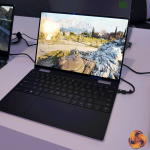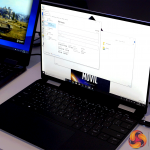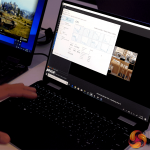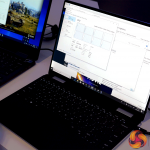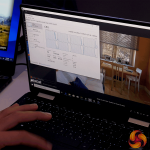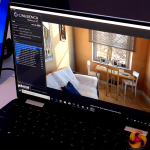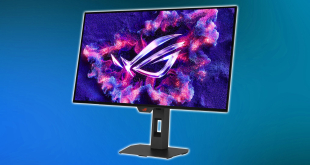Yesterday at Intel's Technology Open House event, we were able to get some hands-on time with a variety of 10th Gen laptops from the likes of Dell, Lenovo, and MSI. And while nobody was around to tell us otherwise, we figured the best way to spend five minutes with the Intel Ice Lake Core i7-1065G7-powered Dell XPS 13 2-in-1 was by sneaking a quick run of Cinebench R20 and watching those clock speeds.
Dell's sleek XPS 13 2-in-1 uses the second highest-end 10th Gen Ice Lake processor currently available – the Intel Core i7-1065G7. That G7 suffix signifies the use of Intel's highest-end, 64 EU Iris Plus Gen 11 graphics in the quad-core CPU. On paper, the i7-1065G7 is a four-core, eight-thread 10th Gen processor built on Intel 10nm process architecture. The clock speeds are 3.9GHz for maximum Turbo Boost speed, with a 1.50GHz base clock in the 25W configurable TDP-up implementation.
We ran Cinebench R20's all-core benchmark to see how the i7-1065G7 scored, and also to track its operating clock speeds throughout the benchmark. Of course, the clock speeds that we observed are heavily influenced by the design of Dell's XPS 13 2-in-1 laptop and the power budget, boost durations, and cooling configuration provided.
It was, however, interesting to see the turbo clock running at close to 3.4GHz for the initial seconds of the all-core benchmark. We would expect to see this level of frequency, but it is still impressive to see the processor maintaining this despite the limited thermal capacity available in Dell's ultra-thin chassis. The clock speed dropped down to 2.85GHz after a few seconds of run time and then 2.6GHz for the steady state period.
The final Cinebench R20 score was 1612, though this was influenced by background tasks and us messing with the system while the run was in progress. With that said, the score is an indication of Ice Lake's compute performance uplift versus Whiskey Lake (and perhaps 10th Gen Comet Lake, core-for-core) especially in tasks that heavily leverage newer AVX instruction sets.
KitGuru Says: Our cheeky run of Cinebench R20 on the Ice Lake Core i7-1065G7-powered Dell XPS 13 2-in-1 gives indication of solid compute performance from the CPU. Let us know in the comments if you'd be interested in further testing in the form of a full review.
 KitGuru KitGuru.net – Tech News | Hardware News | Hardware Reviews | IOS | Mobile | Gaming | Graphics Cards
KitGuru KitGuru.net – Tech News | Hardware News | Hardware Reviews | IOS | Mobile | Gaming | Graphics Cards


